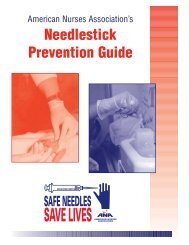Moral Courage in Action: Case Studies - American Nurses Association
Moral Courage in Action: Case Studies - American Nurses Association
Moral Courage in Action: Case Studies - American Nurses Association
You also want an ePaper? Increase the reach of your titles
YUMPU automatically turns print PDFs into web optimized ePapers that Google loves.
do everyth<strong>in</strong>g for the patient, even though the patient is<br />
able and will<strong>in</strong>g to do a number of basic care functions.<br />
The crisis occurs when the son comes to the nurses’<br />
station, scream<strong>in</strong>g at the unit secretary about the staff’s<br />
<strong>in</strong>competence and demand<strong>in</strong>g to see the nurs<strong>in</strong>g supervisor.<br />
The charge nurse is <strong>in</strong> the nurses’ station and is<br />
able to address the hostile situation. What actions<br />
should the charge nurse take?<br />
The ethical obligation <strong>in</strong> this situation is to ma<strong>in</strong>ta<strong>in</strong><br />
an environment that preserves the <strong>in</strong>tegrity of all concerned,<br />
<strong>in</strong>clud<strong>in</strong>g the family. Tom also is obligated to<br />
safeguard the privacy of the other patient <strong>in</strong> Mrs. Host’s<br />
room. The Code (ANA, 2001, p. 19) provides the follow<strong>in</strong>g<br />
guidance for the nurse:<br />
Threats to <strong>in</strong>tegrity may <strong>in</strong>clude…verbal abuse from<br />
patients and coworkers....<strong>Nurses</strong> have a duty to<br />
rema<strong>in</strong> consistent with both personal and professional<br />
values and to accept compromise only to the<br />
degree that it rema<strong>in</strong>s an <strong>in</strong>tegrity-preserv<strong>in</strong>g compromise.<br />
An <strong>in</strong>tegrity-preserv<strong>in</strong>g compromise does<br />
not jeopardize the dignity or well-be<strong>in</strong>g of nurse or<br />
others.<br />
The charge nurse has the ethical and adm<strong>in</strong>istrative<br />
obligation to preserve the <strong>in</strong>tegrity of all concerned. This<br />
will require courage, calmness, and skills <strong>in</strong> conflict resolution.<br />
Too often nurses feel helpless and then quickly call<br />
security personnel, rather than recogniz<strong>in</strong>g that listen<strong>in</strong>g<br />
and mediation might be a better approach. Call<strong>in</strong>g security<br />
staff, or even the house supervisor, is likely to escalate<br />
this conflict. Because this family has been “disruptive”<br />
for a week, it is important to recognize that the<br />
problem has not been resolved for either nurs<strong>in</strong>g staff or<br />
family members. If the charge nurse is not able to deescalate<br />
the situation, then a patient relations representative<br />
might be useful to facilitate a family meet<strong>in</strong>g. As <strong>in</strong><br />
the situation with the dy<strong>in</strong>g patient, the nurse needs to<br />
look for all resources necessary to resolve the problem.<br />
<strong>Moral</strong> <strong>Courage</strong> to Confront Bully<strong>in</strong>g<br />
Melissa started on the unit as a new graduate 5<br />
weeks ago. She is still <strong>in</strong> orientation and has a good relationship<br />
with her preceptor. The preceptor has been<br />
assigned consistently to Melissa for most of the last 4<br />
weeks, but due to family emergency has not been available<br />
<strong>in</strong> the last week. Melissa has been told that she will<br />
be precepted by a different nurse for the rema<strong>in</strong>der of<br />
her orientation. The new preceptor has not been welcom<strong>in</strong>g,<br />
supportive, or focused on the educational goals<br />
of the orientation. In fact, this new preceptor has voiced<br />
to all who will listen her feel<strong>in</strong>gs about the <strong>in</strong>competence<br />
of new BSN graduates.<br />
The crisis occurs when Melissa fails to recognize a<br />
patient’s confusion as a result of an adverse medication<br />
effect. The preceptor berates Melissa <strong>in</strong> the nurses’ station,<br />
makes sarcastic comments <strong>in</strong> shift report about<br />
“<strong>in</strong>ability of university-educated nurses to recognize the<br />
basics,” and <strong>in</strong>forms the nurse manager “that new graduates<br />
are a danger to patients.”<br />
Melissa tells you that she th<strong>in</strong>ks she should resign<br />
and that maybe her previous preceptor was too easy on<br />
her. You know her preceptor is an excellent cl<strong>in</strong>ician and<br />
experienced teacher. What is your advice to Melissa?<br />
The ethical obligation to support colleagues is outl<strong>in</strong>ed<br />
<strong>in</strong> a section of the Code (ANA, 2001, p. 9) below:<br />
The pr<strong>in</strong>ciple of respect for persons extends to all<br />
<strong>in</strong>dividuals with whom the nurse <strong>in</strong>teracts. The<br />
nurse ma<strong>in</strong>ta<strong>in</strong>s compassionate and car<strong>in</strong>g relationships<br />
with colleagues and others with a commitment<br />
to the fair treatment of <strong>in</strong>dividuals....The standard<br />
of conduct precludes...any form of harassment<br />
or threaten<strong>in</strong>g behavior, or disregard for the effect of<br />
one’s behavior on others.<br />
Although workplace verbal abuse has many<br />
sources, it is most stressful when a co-worker is the perpetrator<br />
(Center for <strong>American</strong> <strong>Nurses</strong>, 2007). The nurse<br />
who is bully<strong>in</strong>g <strong>in</strong> this situation is us<strong>in</strong>g the power imbalance<br />
of be<strong>in</strong>g a senior nurse. The victim of bully<strong>in</strong>g is<br />
emotionally affected, result<strong>in</strong>g <strong>in</strong> an <strong>in</strong>ability to use normal<br />
problem solv<strong>in</strong>g as a cop<strong>in</strong>g strategy. Unless someth<strong>in</strong>g<br />
is done, Melissa’s self-confidence and psychological<br />
well-be<strong>in</strong>g will be eroded. By discuss<strong>in</strong>g this abuse<br />
with you, she is less isolated, but your assistance also<br />
needs to <strong>in</strong>clude how to approach the perpetrator.<br />
To support her act<strong>in</strong>g courageously, the guidance to<br />
Melissa should <strong>in</strong>clude the follow<strong>in</strong>g:<br />
1. Prepare what she will say the next time she is criticized<br />
by the preceptor.<br />
2. Include <strong>in</strong> the statement that the behavior is unacceptable<br />
and harmful: “When you criticize me <strong>in</strong><br />
front of people, I feel degraded because your comments<br />
are not meant to help me constructively be a<br />
better nurse. I would like you to focus your feedback<br />
on how I can change behaviors to be a great nurse.”<br />
3. If the confrontation does not work, then she must go<br />
to the manager.<br />
Role play<strong>in</strong>g with her a few times also would be supportive.<br />
What is important is that the nurse speak up;<br />
otherwise the abuse will cont<strong>in</strong>ue.<br />
<strong>Moral</strong> <strong>Courage</strong> to Confront Unethical Behavior In<br />
Management<br />
Sarah was promoted to nurse manager because of<br />
her excellence <strong>in</strong> deliver<strong>in</strong>g patient care and recognized<br />
leadership ability. She was a preceptor, excellent charge<br />
nurse, outstand<strong>in</strong>g patient advocate, and chair of the<br />
practice council. Sarah has been a medical-surgical<br />
nurse for over 10 years and loves the variety of patients<br />
under her care. She only recently completed her BSN<br />
degree and earned her certification <strong>in</strong> medical-surgical<br />
nurs<strong>in</strong>g.<br />
When Sarah was <strong>in</strong> her position for less than 3<br />
months, her immediate supervisor moved to another<br />
state because of his wife’s promotion. This <strong>in</strong>dividual<br />
had been a mentor, confidant, and recognized leader <strong>in</strong><br />
the organization. Sarah tried to make the best of the situation<br />
and follow the direction of her new supervisor.<br />
However, right from the beg<strong>in</strong>n<strong>in</strong>g, she found this <strong>in</strong>dividual<br />
to be very focused on the negative. As an optimistic<br />
person, Sarah found this approach counter to her<br />
basic <strong>in</strong>st<strong>in</strong>cts about people.<br />
Every time she tried to discuss this difference <strong>in</strong><br />
approach, her director would say she was naive and that<br />
the staff was tak<strong>in</strong>g advantage of her good nature. The<br />
director used several of her recent project failures to justify<br />
her position. However, Sarah understood that these<br />
276 MEDSURG Nurs<strong>in</strong>g—August 2007—Vol. 16/No. 4



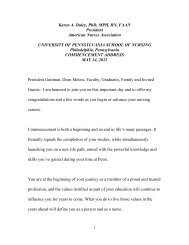
![National Partnership Priorities [PDF] - American Nurses Association](https://img.yumpu.com/50067378/1/190x245/national-partnership-priorities-pdf-american-nurses-association.jpg?quality=85)

![Safety Issues Related to Tubing and Catheter Misconnections [pdf]](https://img.yumpu.com/49621668/1/190x245/safety-issues-related-to-tubing-and-catheter-misconnections-pdf.jpg?quality=85)
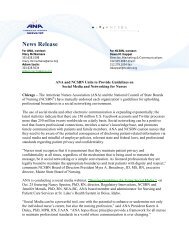

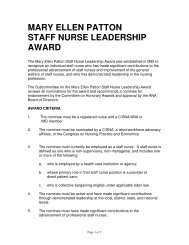
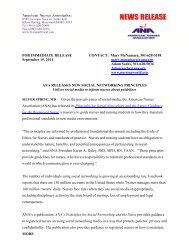
![Luther Christman Award Criteria [PDF] - American Nurses Association](https://img.yumpu.com/43348435/1/190x245/luther-christman-award-criteria-pdf-american-nurses-association.jpg?quality=85)
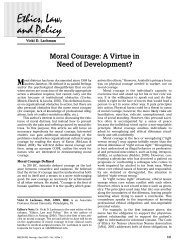
![JHNEBP Non-Research Evidence Appraisal [pdf]](https://img.yumpu.com/42642353/1/190x245/jhnebp-non-research-evidence-appraisal-pdf.jpg?quality=85)


![Jessie M. Scott Award Criteria [PDF] - American Nurses Association](https://img.yumpu.com/36559235/1/190x245/jessie-m-scott-award-criteria-pdf-american-nurses-association.jpg?quality=85)
